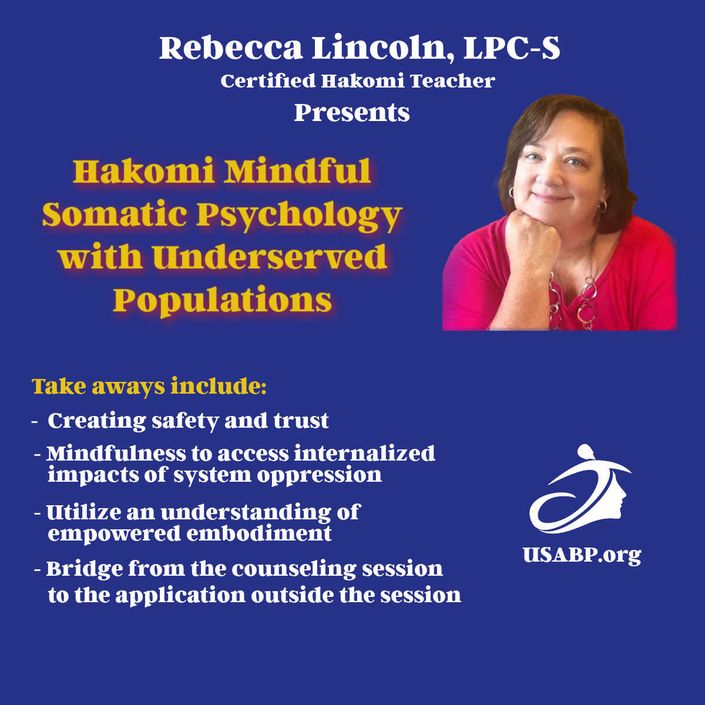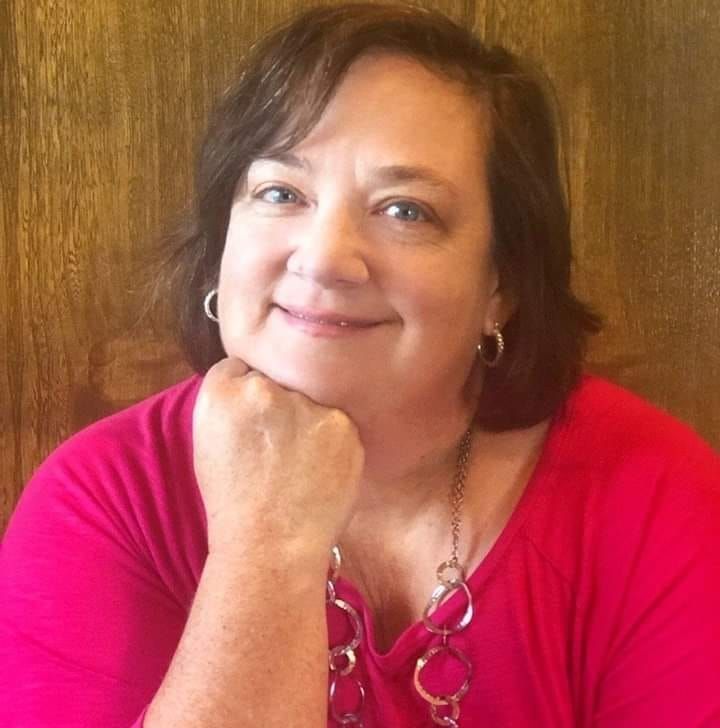
Hakomi Mindful Somatic Psychology
Working with Underserved Populations
USABP Annual Members and Non-Member's freely enrolled here on this site (The USABP Somatic Center for Continuing Education) can take courses with or without applying for CE credits (not all courses offer CE credits).
2 CEs are available for this home study course
Course Costs
- USABP Members do not have to pay the $45 dollar course fee listed on this site.
- This Course is available for $45 to USABP non-members.
- For an additional $15 processing fee USABP Members and Non-Members can receive 2 CE credits for this course.
Live Event Registrant Information
- USABP Members do not have to pay the $45 dollar course fee listed on this site. Members who want CE creditsdo have to pay the CE processing fee (when CE credits are listed as available)
- Non-members who paid for the live version of this home study course (at USABP.org) do not have to pay the $45 dollar course fee listed on this site.
- Non-Members, who paid for the live course event or home study version here, and want CE credits do have to pay the CE processing fee (when CE credits are listed as available).
Discount Check-Out Instructions for Members and Non-Member Live Event Paid Registrant (on this site only)
- Use your 100% off discount code during the checkout process.
- eMail info@usabp.org to request your discount code (it will deduct 100% off for this course on this site). Please identify in the email the course you are referring to and whether you are a USABP Member or a Non-Member Live Event Paid Registrant for this course.
NOT A MEMBER or Paid Event Registrant and WANT THE DISCOUNT?! Plus, many more $avings and benefits? Join us.
Course Description
Are you a therapist in a setting working with underserved populations? This webinar will offer somatic activities to enhance your work with clients. For advanced students of Hakomi this webinar brings a fresh take on utilizing Hakomi with underserved populations.
Honoring the bio-psycho-social world of our clients is deeply important when applying somatic therapies. This webinar will introduce you to Hakomi Mindful Somatic Psychotherapy’s unique application of mindfulness. We will spend some time raising awareness of internalized impacts of systems of oppression. We will consider the dynamics of safety and trust when building relationship with people who are part of underserved populations.
Through experiential exercises, you will explore the implementation of mindful self-study as an approach to illuminate internalized impacts of our bio-psycho-social worlds and offer clients opportunity for embodied empowerment. At the core of this presentation is a deeply held belief that it is a practitioner’s role to respect a client’s voice in how they choose to interact with systemic oppression. Hakomi’s approach to transformation bridges loving presence and mindful awareness to listen for what arises from within a person and provide attuned facilitation of healing.
Main Points of Workshop
▪ Understanding Hakomi’s unique application of mindfulness
▪ Identifying key underserved populations
▪ Considerations in building safety and trust with underserved populations
▪ Utilizing mindfulness to illuminate and transform the internalized impact of systemic oppression
▪ Empowered embodiment as transformation
▪ Creating context for empowered embodiment to be portable.
Participants will be able to:
▪ Apply three considerations in creating safety and trust with under-served populations
▪ Conduct one mindful self-study strategy to access internalized impacts of system oppression
▪ Utilize an understanding of empowered embodiment
▪ Explain to their client how to integrate these tools learned in the counseling session and apply them outside the session
Your Instructor

Rebecca Lincoln, LPC-S (she/her/hers) resides in the piney woods of rural East Texas. She is an adjunct instructor with the University of Texas at Tyler and teaches in the Clinical Mental Health Counseling Program in the Department of Psychology and Counseling. Ms. Lincoln is certified as a Hakomi Teacher with the Hakomi Institute. Her counseling experience includes working in both non-profit facilities as well as in the private sector. Over the last twenty years through state grants she has worked with school-based/home-based services. Early in her education she volunteered with a county correctional facility; and, she worked for eight years with a local non-profit center where she served as both a psychotherapist and as clinical director. As often happens in a rural community and in a non-profit setting, Ms. Lincoln has worked with people from various races, ethnicities, gender orientations, sexual orientations, physical abilities, and faith orientations. Her teaching includes an awareness of the multi-layered aspects of identity, and she continues to deepen her understanding of the impacts of internalized systemic oppression.
